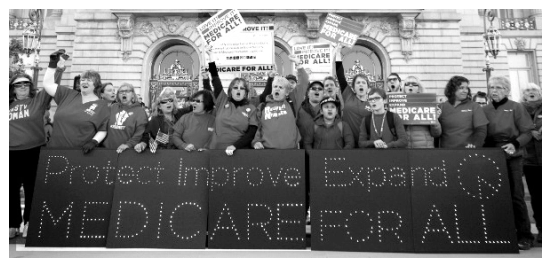Dialogue with Don Bechler


Originally published on 10/5/2019
[Note: Following is a dialogue between Don Bechler, chair of Single Payer Now, a California-wide organization that is affiliated with Health Care Now on a national level, and Alan Benjamin, editorial board member of The Organizer newspaper. It took place in San Francisco on May 30, 2018.]
Alan Benjamin: Don, Single Payer Now organized a public forum in San Francisco to expose the attacks on Single Payer by both Republicans and Democrats. At your event, you referenced repeatedly a document titled, “Democratic Party Talking Points Provided by the Democratic Congressional Campaign Committee for Candidates to Use to Divert Conversations Away from and Criticize Single Payer.” What is this document and what is its significance?
Don Bechler: This document is proof of what many of us have been saying for a couple of decades about the Democratic Party and Single Payer healthcare — namely, that the Democrats always find ways to divert this discussion with language like, “Yes, we support Single Payer, but … we cannot do it because of A, B, C, D, E, F, or G” … and the list keeps going.
It’s proof that will help us convince more people to go out and build a massive and independent movement for Single Payer healthcare, or Medicare For All.
A.B.: Many people who’ve read this “Talking Points” memo were alarmed. What is your assessment?
D.B.: At a time when more and more people are bringing up the need for Single Payer, this is a document, as its title says, to divert the conversation away from Single Payer by insisting on the many things we need to do first. It calls, for example, for lowering people’s healthcare costs by “allowing the federal government to negotiate with drug companies to get a lower price on medications for people on Medicare, like the Veteran Affairs Department does.”
So they don’t come out and say, “I hate Single Payer”; they say, we need to do all these other things.
The second point in the document is the call to “allow more middle class families to qualify for tax breaks to reduce their healthcare costs.” Again, they’re saying something, but it’s not a Single Payer solution.
If you are a true healthcare advocate, you want a system that provides healthcare for everybody. You want it to be financed through progressive taxation and be comprehensive, and for everyone to have it, just like public education.
If you read their document, you see that we have to do this thing first and that thing first. It’s always, “Yes, but …” It’s always been, “Yes, but …” from the Democrats over the past 25 years that I’ve been working on this issue.
A.B.: But there is more than “diverting the conversation” in the Democratic Party’s “Talking Points” document. There is also sharp criticism of Single Payer, taken almost directly from the playbook of the Republican Party. The authors, for example, take issue with the Vermont Single Payer campaign, stating that there is really no viable financing mechanism in a Single Payer plan. Your response?
D.B.: The governor in Vermont backed away from his support to Single Payer because he was pressured by the private insurance industries to back off. The largest employer in the state, which is IBM, also put pressure on the governor.
As for the financing in Vermont, the authors of the “Talking Points” memo came up with a figure of a 10% increase in the income and business taxes. But that is still cheaper than what you’d be paying now with all the insurance premiums and out-of-pocket costs.
There are three bills in play that I am concerned about. One is a California bill called the Healthy California Act (or SB 562). It would save $37 billion a year, which is a lot of money. More important, it provides healthcare for everybody, including undocumented immigrants in the state of California.
The other two bills in play are national bills: HR 676 (with more that 100 members of Congress who support it) and SB 1804 (with 15 U.S. Senators who support it).
There are pluses and minuses to these two bills: The U.S. Senate bill would override the Hyde Amendment, which prevents women from seeking abortions with federal funds. The other two bills don’t really do that. HR 676 provides for long-term care. The Senate bill does not.
But the fundamental thing is that they’re both moving forward with a national health plan that guarantees healthcare for everybody and saves billions of dollars.
A.B.: Bernie Sanders made this issue a centerpiece of his campaign. Millions of people came out in support of Single Payer. And yet Bernie got smashed on this issue at the Democratic Party national convention just prior to the 2016 election. Nurses from CNA came back to California and reported that the DNC issued an explicit directive to prevent any discussion about, or any support for, Single Payer at that convention or in the months leading up to the November general election. Why can’t the Democratic Party get behind Single Payer?
D.B.: The Democrats, fundamentally, are supporting the 1 percent in this country, and Single Payer runs counter to the interests of the 1 percent. A lot of these people are big donors to the Democratic Party, and they have big investments in the health insurance companies.
Here in California Gavin Newsom is running for governor. Some people think he’ll support Single Payer. Maybe yes, maybe no. On occasion he says he does, but it’s usually accompanied by many “buts.” If you look at where his campaign funding is coming from, you will see that he received $922,000 from Blue Shield of California, an insurance company. If he really wanted to show some integrity around Single Payer, he would announce that he is not accepting any money from the health insurance companies. But he is not doing that.
A.B.: The AFL-CIO first endorsed Single Payer at its national convention in Pittsburgh in 2009, but it went on to campaign for a “public option” and then for Obama’s Affordable Care Act, pushing Single Payer way into the background.
At its most recent convention in St. Louis, the AFL-CIO vowed to be more forceful in its support for Single Payer, but this, again, is not likely given their subordination to the Democratic Party, which, as we have seen with their “Talking Points” memo, does not want to touch Single Payer.
What’s it going to take to get Single Payer enacted in this country?
D.B.: There are different opinions about this question in the Single Payer movement. Our organization, Single Payer Now, is dedicated to winning an initiative in California at some point for Single Payer. Our criteria for moving on this is to have 5 million people in a database, so that we can communicate among ourselves and launch a winning campaign.
The media are opposed to us. No matter how good our arguments, they come out and find a low-level economist somewhere to say, “This won’t work.” And they give 12 reasons for that.
I support people who want to go out to pass Single Payer through the legislatures, though I have less confidence in that. People have a lot of illusions about what we can get done in Sacramento or Washington, DC.
My goal is to build an electorate that is solidly Single Payer, where any candidate who says I’m not for it gets booed off the stage.
A.B.: Any final comments?
D.B.: Democratic Party politicians are taking advantage of the Single Payer movement. They see it has some energy, because it does at times. So they say, “Hey, I think I’ll support this issue and get some campaign volunteers.” Then later on they take a dive on it. I’m nervous right now about Newsom, and I’m nervous about Ricardo Lara, who sponsored the Senate bill.
A.B.: So it’s about building an independent movement for Single Payer that is not beholden to the Democratic Party politicians?
D.B.: Yes, absolutely.

